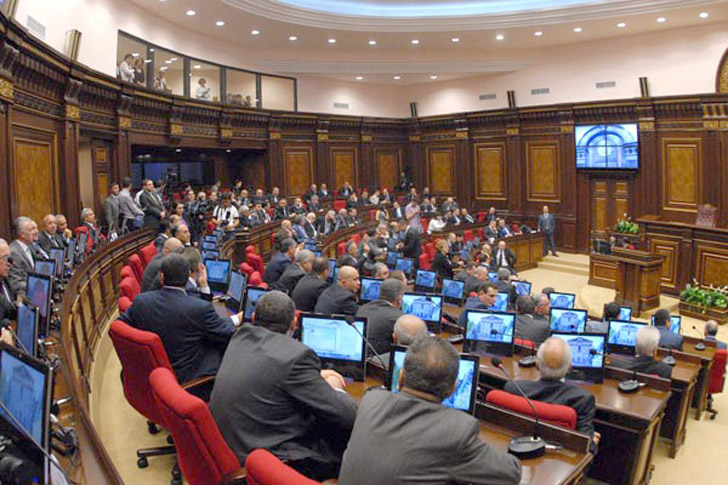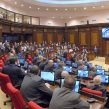
New Armenian Government Taking Shape
Publication: Eurasia Daily Monitor Volume: 9 Issue: 111
By:

Armenia’s President Serzh Sargsyan has set about forming his new government in a significantly changed political configuration that emerged from the May 6 parliamentary elections won by his Republican Party (HHK). The cabinet currently taking shape will be missing a key political player, the Prosperous Armenia Party (BHK), which finished second in the polls and could cause Sargsyan trouble in the more crucial presidential election due in February 2013. The BHK’s decision to pull out of the country’s ruling coalition is a further indication that Sargsyan’s predecessor Robert Kocharian is planning to try to return to power.
As expected, the current prime minister, Tigran Sargsyan (no relation), was reappointed to his post on June 2. Immediately after, the president signed a new power-sharing agreement with the Orinats Yerkir (Country of Law) party, a junior partner in the outgoing coalition (www.news.am, www.a1plus.am, June 3). Orinats Yerkir has been represented in the executive branch by three ministers since 2008, and is expected to have as many ministerial portfolios in the new cabinet. One of those Orinats Yerkir representatives, Emergency Situations Minister Armen Yeritsian, was reappointed along with Defense Minister Seyran Ohanian and Foreign Minister Edward Nalbandian on June 4 (Statement by the presidential press office, June 4). HHK representatives made clear that virtually all of the other cabinet members, except the four ministers affiliated with the BHK, will also keep their jobs.
President Sargsyan has been keen to continue to share power with the two political forces despite the fact that his party will control at least 69 seats in the 131-member National Assembly, compared with 37 seats held by the BHK and 6 by Orinats Yerkir. Continued coalition rule would have clearly lent greater legitimacy to the HHK’s disputed election win. More importantly, it would have almost certainly committed the BHK to supporting President Sargsyan’s plans to win a second term in office.
The BHK and its businessman leader, Gagik Tsarukian, have been reluctant to pledge such support, opening serious cracks in the three-party coalition in the months leading up to the parliamentary elections. Tsarukian’s party campaigned on an essentially opposition platform, criticizing government policies and promising to change them radically. It then joined two leading opposition groups in questioning the credibility of the official vote tally (see EDM, May 11). Nevertheless, Sargsyan tried hard to convince Tsarukian to remain part of his administration in the following weeks. The two men seemed close to reaching an agreement, with some senior HHK and Orinats Yerkir figures expressing confidence that the BHK will not quit the government.
Tsarukian announced on May 24 that the BHK will not join the new government after all because it would lack the power to deliver on “substantial changes” promised to voters. “As a result of the elections, the BHK does not have a constitutional capacity to form a government and implement its programs,” the tycoon said in a written statement (www.armenialiberty.org, May 24). The move put Kocharian, who is widely regarded as Tsarukian’s political patron, in a position to continue to challenge Sargsyan or at least haggle with him over the BHK’s stance on the 2013 presidential ballot.
Kocharian again exposed his desire to return to active politics in an interview with the Mediamax news agency that was published three days before the parliamentary elections. The ex-president, who handed over power to Sargsyan in 2008, made clear that he is “unhappy with the results of the government’s activities, especially the economic ones” (Mediamax news agency, May 3).
In public, Tsarukian and his associates remain reticent about whether the BHK will field its own presidential candidate or eventually back the incumbent president for reelection. They are also reluctant to explicitly characterize the BHK as an opposition organization, using instead euphemisms such as “an alternative to the authorities.”
The opposition Armenian National Congress (HAK) alliance led by Levon Ter-Petrosian, another former president, is looking to capitalize on its deepening rift with the government. Ter-Petrosian’s chief lieutenant, Levon Zurabian, told RFE/RL’s Armenia service on May 24 that the BHK’s new status is “contributing to the regime’s political isolation.” The HAK already cooperated with Tsarukian’s party during the parliamentary race.
Other major opposition forces, notably the Heritage party, are far more skeptical about the BHK’s opposition credentials, saying that Tsarukian will cut a deal with Sargsyan in the months ahead. Indeed, the presidential camp is hopeful that the BHK will at least refrain from mounting a serious challenge against Sargsyan. “Who said that the BHK will be in the opposition?” Prime Minister Sargsyan told journalists on May 28 (Haykakan Zhamanak, May 29).
Accordingly, local pundits expect President Sargsyan to make another attempt to buy the BHK’s loyalty ahead of the 2013 election. The BHK’s asking price for that support may be too high for him, however. Tsarukian reportedly demanded the post of prime minister for his political team but was firmly rebuffed in the recent post-election negotiations with the head of state (www.armenialiberty.org, May 21). With Kocharian lurking in the background, accepting that demand would mean placing a significant curb on Sargsyan’s presidency. The Armenian leader should be mindful of the fact that Kocharian was already named Prime Minister in April 1997 by then President Ter-Petrosian. The latter was forced to resign and was replaced by Kocharian less than a year later.
Sargsyan might ultimately conclude that facing an open challenge from the BHK in the presidential race is less risky than giving Kocharian serious government levers. In any case, he will be safe in the knowledge that the ruling HHK has grown adept at ensuring desired election results and keeping major Western powers largely happy with the conduct of Armenian elections.




